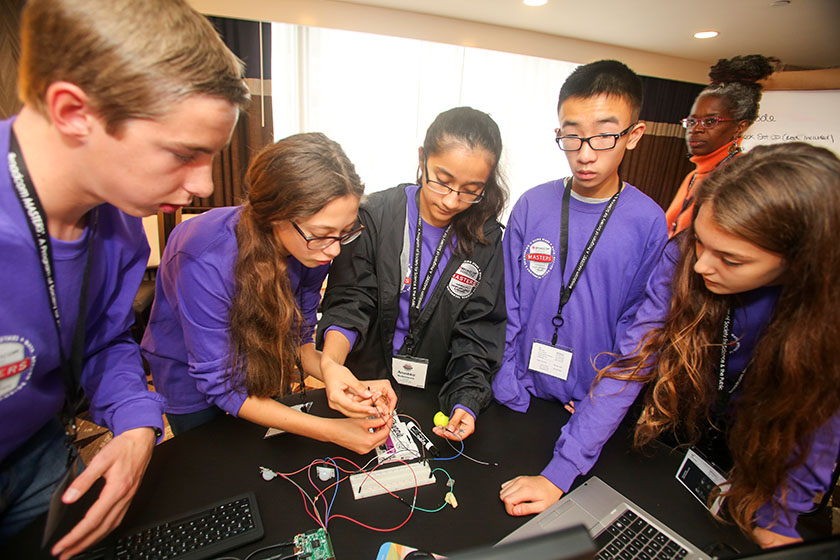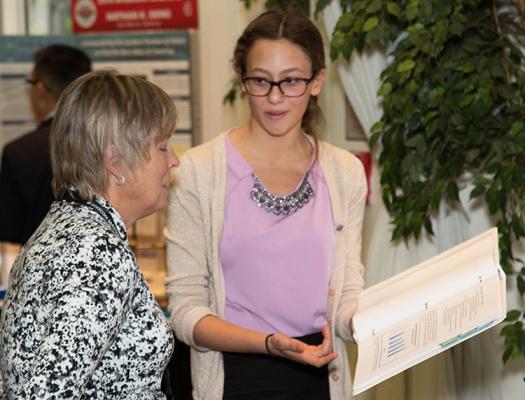Alumni, Broadcom MASTERS, Young & Amazing
Gut feelings: Roundup’s effect on the microbiome

The human microbiome is a collection of bacteria, viruses, and other microscopic organisms that inhabit the body. There is a balance of good and bad bacteria within our guts.
Gut microbiome plays an important role in digestion, and “has recently been implicated in health conditions including heart disease, obesity and asthma, and may even influence behavior,” according to a September 2016 article in Science News.
One middle school student studied the effect of the weed killer Roundup on human gut bacteria. The Society caught up with Aria Eppinger after she won the Robert Wood Johnson Foundation Award for Health Advancement for her project at the 2016 Broadcom MASTERS in October.
Read on to learn how the weed killer might be affecting the balance of gut bacteria in humans.
WHAT’S THE EFFECT OF ROUNDUP ON GUT BACTERIA: My work suggests that Roundup could throw off the good-bad gut bacteria balance in people. It can potentially lead to serious diseases like cancer, diabetes, obesity, anxiety, and depression.
Roundup could throw off the good-bad gut bacteria balance in people.
My work suggests that Roundup will kill off the good bacteria at a lower dose than the bad. This implies that after an exposure to Roundup, good bacteria will be killed off while the bad live. Because there is now an excess of bad bacteria, the balance of good and bad bacteria is now thrown off — called gut dysbiosis.
Although farmers have used Roundup since the 1970s, some recent studies question its safety. Findings suggest it could lead to an imbalance in beneficial and harmful gut bacteria in farm animals.
Support future young scientists. Join the Society today!
THE IMPORTANCE OF GUT EQUILIBRIUM: It is important to have a balance between the good and bad bacteria because the imbalance of this, called gut dysbiosis, is associated with serious diseases like cancer, diabetes, obesity, anxiety, and depression.
GETTING DEEP IN THE GUT: I grew two types of bacteria found in the human gut. C. sporogenes was the model beneficial species and E. coli was the model harmful species. Water and an antibiotic served as my positive and negative controls.
I let the bacteria colonies grow for 24 hours at the same temperature. And I subjected the experimental groups to five different dilutions of Roundup. Every 10 minutes, I took readings from a colorimeter, a device which measures the intensity of color. The more the bacteria in each sample grew, the more it would absorb certain wavelengths of light and emit color.
The more bacteria grew, the more it would absorb certain wavelengths of light and emit color.
I collected data over the course of 12 hours for each of three trials. And I made adjustments to control for each species’ growth rate. I also calculated the concentration of weed killer that would inhibit growth for half of each bacteria colony. The dose that inhibited the beneficial bacteria was more than an order of magnitude smaller than that for the harmful bacteria.
Aria describes her research with a judge at the 2016 Broadcom MASTERS Project Showcase.

HER STEM GOALS FOR THE FUTURE: Because my results suggest that exposure to Roundup could cause gut dysbiosis and lead to serious disease, more research is needed to fully understand its effect on the human gut microbiome.
I am currently working on furthering my research on Roundup’s effect on the human gut microbiome. I am hoping that my research might bring awareness to the impacts that Roundup could have on the human gut and human health.
HOW SHE BECAME INTERESTED IN SCIENCE: From a very young age, I was always interested in mathematics, specifically looking for patterns in art and numbers. My interest in science came from my love to explore the world in which we live and how it works.
I’m interested in the science behind cooking and baking.
I’m also interested in the science behind cooking and baking. I like baking things like cakes and sweets, and have been interested in how different proportions of ingredients impact baking results. I want to play around with these proportions when I bake sweets at home, not as a science project though. But it was experimenting with baking when I was younger that started me on the path to science experiments.
HER FAVORITE PART OF BROADCOM MASTERS: My favorite part was meeting the other 29 finalists who shared my passion and love for STEM. We were all doing really innovative and interesting projects.
Participate in science fairs with projects about things you’re interested in.
WHEN HER NAME WAS CALLED FOR THE ROBERT WOOD JOHNSON FOUNDATION AWARD FOR HEALTH ADVANCEMENT: It was a fabulous experience to win this award. I am really grateful to the Society for Science & the Public, the Broadcom Foundation, and the Robert Wood Johnson Foundation for making this experience possible.
Win, lose, or draw, going to Broadcom MASTERS has inspired me to continue work in STEM, especially medicine related fields.
[Editor’s note: This year, Broadcom MASTERS unveiled new awards. One was the $20,000 Robert Wood Johnson Foundation Award for Health Advancement, which recognizes the student whose work and performance shows the most promise in health-related fields.]
ADVICE FOR OTHER YOUNG PEOPLE INTERESTED IN STEM: I would recommend that people do what they love. Doing what you love with STEM is really fun and interesting. I would encourage people to participate in science fairs with projects about things they are interested in.


